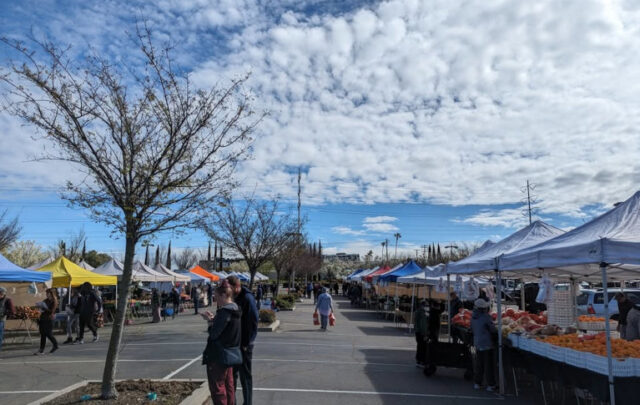The moment that you arrive at Blaenffos Market Garden in Pembrokeshire you can see that there is an artist’s hand at work – the garden has a peaceful, thoughtful order, free from the messy chaos of most farms. The six-and-a-half-acre site has been running for eight years, evolving and changing over time, farmed by Debbie Rees and Julian McKenny, both artists. The site is based on the ethics and principles of permaculture – a socio-ecological-economic practice that aims to care for the land, care for people by using the land’s resource and offer everyone a fair share of its productivity. Debbie and Julian use organic no-dig practices and build fertility by growing plants like comfrey and nettles which supply nitrogen and micro-nutrients to the soil.

The first four years on the land were spent in hard graft, a period described by Debbie as “when they were absolutely exhausted.” But there was an underlying desire to be more outward looking and diversify their lives. As artists, they wanted to support other artists and felt this was also a way of supporting their own work as well, so over the last three years, they began to think about how they might achieve this, and Vegetable Agenda was born.
Vegetable Agenda is a programme for artists, but also a clever farm diversification – a way of bringing a wider public onto the site to see what they are doing. They want “the land to be a resource for artists, encouraging engagement with aspects of sustainable living and food production…” The programme, which is still developing, will include collaborative projects and events, as well as residencies and other involvement in land-based activities. Part of the impetus for the project came from the building of their straw-bale house on the site. It provided a temporary space – before being transformed into a home – for their first hosted exhibition, Basic Human Needs.
The exhibition was premised on the thinking of Manfred Max-Neef, a Chilean economist, who is best known for his outline of ‘Fundamental Human Needs’ which propose the principles for defining sustainable development. These needs are ‘finite and classifiable’ and oppose the concept of ‘wants’ that are vague, myriad and infinite; they outline a set of physical, emotional and social requirements for human survival that if met adequately by society at large, would create a more equitable and better quality of life for all. Debbie was introduced to the thinking of Max-Neef when she went on a workshop, as part of Transition Llandrindod Wells, run by Inez Aponte of Growing Good Lives on ‘Real World Economics’. The workshop explored the idea in Max-Neef’s words that, “The purpose of the economy is to serve the people, and not the people to serve the economy”. A concept in dire need of critical attention in a world dominated by neo-liberal capitalism.

In keeping with the idea of ‘a fair share’, one of the cornerstones of permaculture practice, Debbie and Julian make it a priority to sell their produce at an affordable price to local people. The small, but full, farm stand is busy through the day with people stopping by for their veg. They also sell to local shops. It’s a productive endeavour built around a small is beautiful ethic. On their website, they state, “We are interested in a different economic model, investigating systemic change in society and how we go about that. So, nothing too heavy!”
The principles of permaculture interface neatly with those of artists’ practices. The principles, laid out by David Holmgren, one of the originators of the thinking and theory around permaculture, include ‘cultivating a flexibility of mind’ and ‘accepting feedback’ – both critical in the creative process of artists. Similarly, creativity is an important component of permaculture practice which is defined from Holmgren’s perspective as a “creative design process based on whole-systems thinking” – a description that could easily define the creation of art as well. Julian explains in more detail that, “People who are drawn to permaculture want to innovate or break rules or not quite do it the normal way; and people who trained as artists…that’s what you get and we’ve always been able to adapt, alter and change…we’ve improvised.”
The exhibition is step one for Vegetable Agenda, but they are also developing an artist residency at Blaenffos that will engage with the work they do in the Market Garden, but also allow people time to develop their own art in response to the land. They want to encourage people to utilise resources found on site, rather than bringing in the materials they typically work with. Mita Solanky, one of the artists from the Basic Human Needs exhibition, will be the first artist to take up this position during the last half of August. The idea is not necessarily to recruit artists who are already engaged with agriculture or sustainable food issues; they want something more open ended, hoping that what they do on the site might encourage artists to think in other ways.
Playfulness is an important part of what they want to do here – to play with ideas and to play with the land. Humour permeates the project, as testified to by the jar on their farm stand that comments, “Be the CHANGE you want to see” (paraphrasing Gandhi). Work by Rhys Reece Rees, a collective that Debbie and Julian are a part of, adds to this playful discourse. The jar on the farm stand is one example, as are other interventions in the exhibition – an envelope of ‘Basic Human Needs Seeds’ which invite you to “take a moment of idleness in which to creatively sow your seed with affection. Feel the freedom to express your identity in the sowing and therefore gain understanding through self-reliance and subsistence living…” The small packet of seeds is a seamless integration of art and life, reminding us that creativity feeds mind and body, beautifully capturing the idea at the core of Vegetable Agenda.





